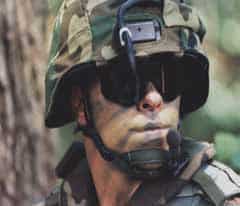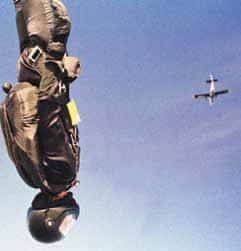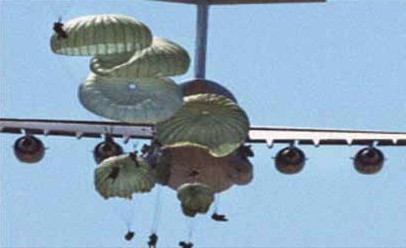Surgical methods of vision correction have made it possible for many people to function at a consistently high level in a wide variety of duties and occupations. Particularly in the context of active duty service in hostile situations, often including adverse climate conditions, contact lens wear is not always a reliable form of vision correction. Neither, for that matter, is the use of prescription eyeglasses. This has been recognized by all branches of the US military, and now each branch of the Armed Forces has its own policy regarding vision correction treatment. We present here a brief overview of the prevailing policies for each branch of the US Armed Forces as we understand them. We also provide links to relevant sites where more detailed information can be obtained directly from the appropriate service website. It is imperative that every individual contemplating military service, or already engaged in same, become familiar with the specific regulations pertaining to surgical vision correction for their chosen or assigned branch of service. While we can offer information and guidance on a web page like this, and while we endeavor to maintain up-to-date information on vision correction policies of the US Armed Forces (and other branches of Government service including FBI, US Treasury, Dept. of Homeland Security, and the numerous Federal, State and local law enforcement agencies), you should not rely solely or exclusively on the information contained herein before making a decision about surgical vision correction. Service branches are listed below in alphabetical order.
While we make every effort to periodically update info on this and other pages of our site, it is the responsibility of each military service person to do his or her research, know the appropriate rules and regulations for their position/service branch, consult with his/her supervising officer(s) and chain of command, and schedule care with associated leave appropriately.
 US Air Force
US Air Force
The US Air Force has since about 1997 permitted PRK (or equivalent forms of surface treatment) for pilots and aviation-related duty positions, but had considered LASIK disqualifying for duty. In May 2007, this position was substantially revised. USAF now allows LASIK for all classes of aviators. The change in policy became effective after studies showed there was little or no difference between LASIK-treated eyes and untreated eyes when subjected to wind blast experienced during aircraft ejection or exposure to high altitude, and to high G-forces. This approval followed closely after the NASA medical advisory board recommended LASIK approval in astronauts.
All applicants to aviation-related career fields — regardless of whether they have had corrective eye surgery — must still meet the vision requirements articulated in AFI 48-123. The change also removes the altitude and high-performance aircraft restrictions for people who have had LASIK.
For detailed information, you can download the May, 2007 USAF Refractive Surgery Program memo detailing relevant updates and changes. This is a 17-page memo so don’t be surprised that it’s a 4.4MB file size at download. For further information see the USAF Refractive Surgery Program site.
 US Army
US Army
The Army reviewed what was known about the safety of laser refractive surgery in the civilian population to include safety in active sports figures such as boxers, NFL football players and others and determined there was good reason to expect safe results in the Army’s most valuable asset….the soldier. Additional studies within the military were begun and examined military specific issues such as parachute jumping and prolonged field duty after laser refractive surgery.
Restrictions and/or special waivers exist for soldiers who have had refractive surgery prior to entry into training programs for aviation, airborne, Ranger, Special Forces, HALO (high altitude, low opening), marine diving or combat diving.
Visian ICL care is an acceptable form of vision correction surgery for most, if not all, Army duty positions to our knowledge. A recent study of 500 ICL procedures performed by US Army surgeons at Ft. Bragg NC reflected generally excellent visual outcomes, but the follow-up interval was relatively short (less than 1 year of post-op data) so this study may not identify later-appearing adverse consequences of care. Study data was published in a monograph Visian CL On Duty, a promotional brochure developed by Staar Surgical, the manufacturer of the ICL.
-
Since it was introduced in 2006, the US Military has routinely used and implanted over 5,000 Visian ICLs. Over 80% of the US Soldiers achieve UVCA on 20/15 or better and 86% achieve UCVA the same or better than pre-op BCVA.
-
The Visian ICL delivers exceptional vision for the most demanding, younger, active patients, including those with mild myopia as low as -3.0 diopters.
-
Opinions of over 200 US Soldiers highly rate the technology and believe the Visian ICL enables them to function and perform better.
-
100% of the US soldiers rate the Visian ICL as providing better vision than their previous spectacles, and would have the procedure again



 US Coast Guard
US Coast Guard
Coast Guard personnel may choose to have PRK or LASIK. All methods of laser vision correction (PRK, LASIK and LASEK) can be waivered for accessions, if they meet all other vision and eye policies. PRK or other methods of surface treatment have been acceptable (within guidelines as specified) since at least the year 2000. Coast Guard policy was apparently revised in mid-2005 to permit LASIK as a treatment option, where previously it had been disqualoifying for most active duty positions. Refer to updated Refractive Surgery Policy in Chapter 3D or the Refractive Surgery Program Summary in the April 2008 USCG Flag Voice
Vision correction for active duty members can be obtained through DoD or civilian providers. Like any other elective procedure, care would be obtained at the cost, time and risk of the individual.
 US Navy & Marine Corps
US Navy & Marine Corps 
The Navy does recognize and support both LASIK and PRK for active duty personnel, with specific restrictions, as long as strict guidelines are respected and follow-up care is maintained. Prior to about 2009, LASIK was disqualifying for naval aviators but subsequently LASIK was deemed acceptable. LASIK is not disqualifying for general duty positions. The Navy now publishes its policies regarding Ophthalmology conditions in aggregate, and laser vision correction considerations in specific, in a US Navy Aeromedical Reference and Waiver Guide which was last updated in 2015 (see pp 24 – 29 for info about laser refractive surgery). The permissions and restrictions representing official Specific Navy & USMC Policy by Procedure and Duty Classification as published in April ’04 is also shown. SEALs have specific visual requirements and these generally parallel other warfighter directives for Special Forces.
More Information is available through the Refractive Surgery Center at Naval Medical Center San Diego.
If you are not on flight status and would like to have refractive surgery by a civilian provider such as Dr. Wallace or Dr. Moarefi at LA Sight, you will need to fill out a request form. It is your responsibility to get written permission from your Commanding Officer to have any refractive surgery performed by a civilian provider. You may also review the BUMED policy on prioritazion of requests for refractive surgery by active duty personnel, copied here for your convenience.
Air National Guard
Air National Guard (“ANG”) regulations regarding laser vision correction vary from state to state. Certain states, including Massachusetts, consider LASIK absolutely disqualifying for entrance into any aviation position in their ANG. By contrast, in Massachusetts, PRK is not disqualifying for entrance into an ANG aviation position. It is difficult if not impossible to keep track of every state’s requirements, and the various state-by-state variations in entrance criteria, so we encourage candidates (or applicants as the case may be) to check with their service branch for specific details. Also, be aware that entrance criteria may be differnt than for maintenance of active duty status.
Disclaimer: The above information should not be relied upon as the main source of guidance regarding vision correction care and service in any branch of the US Armed Forces, National Guard, or Federal, state or local law enforcement. All of these organizations carry their own requirements for vision correction care, and these may be different for accession (new applicants) and active duty personnel. service If you desire to serve in any law enforcement capacity, we strongly encourage you to find out what the specific requirements are for the division, service or department that you intend to join.